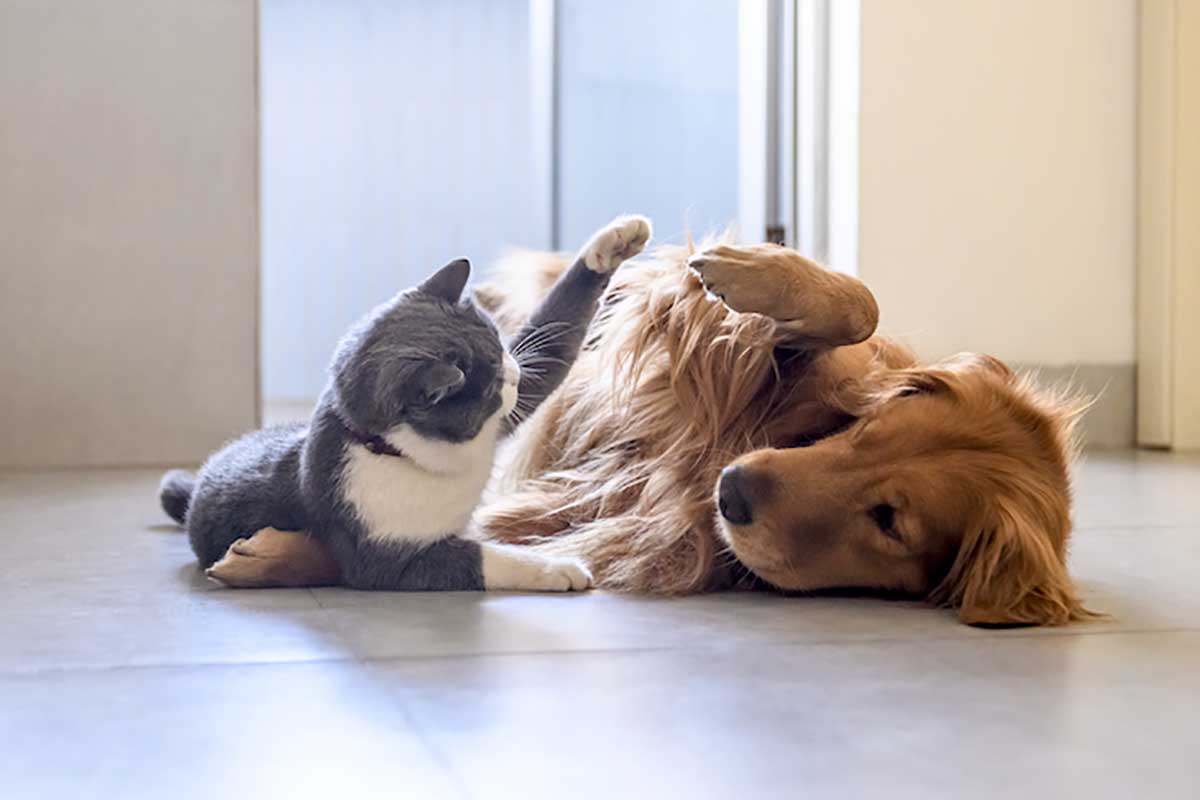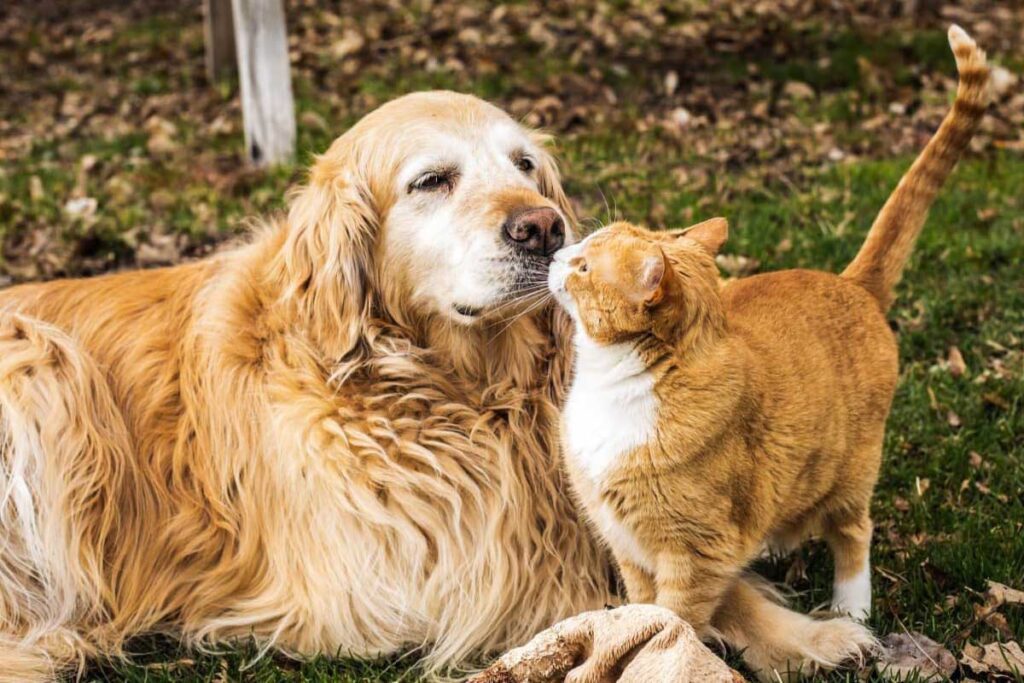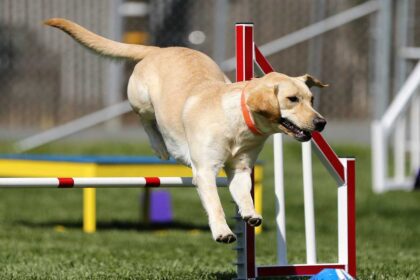Keep them separate at first:The answer, as with most things in the pet world, isn’t quite black and white. While Golden Retrievers are generally considered good with cats, several factors influence their interactions. And the word “golden” fits them perfectly, capturing their classic charm and warmth.
Golden Retrievers generally have a good reputation for being cat-friendly. In fact, a study published in the Journal of Veterinary Behavior found that nearly 70% of Golden Retrievers showed positive responses when introduced to unfamiliar cats.
Let’s delve deeper into this furry dynamic, exploring compatibility statistics, individual personalities, and tips for successful introductions.
Understanding Golden Retrievers
The loving nature of the Golden Retriever breed makes them excellent companions for families,and their intelligence makes them highly capable working dogs.Their high level of cognitive ability enables them to pick up new things fast.
They are known for being affectionate towards humans and other animals, making them popular family pets.
Golden’s Gentle Reputation
Golden Retrievers, nicknamed “Goldies,” boast numerous traits conducive to feline friendships:
- Low prey drive: Unlike breeds bred for hunting, Goldens generally lack the urge to chase small animals. A 2018 study published in the journal “Applied Animal Behaviour Science” found that only 18% of Golden Retrievers displayed strong chasing behavior toward cats, compared to 50% of other breeds.
- Friendly and adaptable: Bred for companionship, Goldens are known for their easygoing nature and willingness to adapt to various living situations, including multi-pet households.
- Gentle and patient: Their gentle dispositions make them less likely to overwhelm or frighten smaller animals like cats.
- Playful companions: Goldens can have lighthearted play sessions with cats due to their lively and inquisitive disposition. By interacting, you can strengthen your bonds and lessen any possible hostility.
- Mutual curiosity: Golden Retrievers and cats are inherently curious. With time, this shared interest may develop into a cordial bond in which both animals learn to tolerate one another’s personal space.
Introducing Golden Retrievers and Cats
When introducing a Golden Retriever to a household with cats, it’s essential to proceed gradually and with caution. Both animals should feel safe and comfortable in their environment.
- Keep them separate at first: For the first three to four days at least, keep the pets apart. Withhold all communication until your new pet has been examined by a veterinarian and declared healthy.
Put your new pet in a different room in your house or a sanctuary with the door closed.The idea is to avoid direct touch between the pets so they can become accustomed to each other’s presence.
They are able to smell and hear one another even if they are unable to sight one another.
- Feed them on opposite sides of a closed door: The intention is to instill in them a positive association between the other pet’s presence and enjoyable things, such food. After every feeding, move their food bowls a little bit closer to the closed door.
This procedure should be repeated until every pet can eat peacefully in front of the door.
- Teach them fundamental commands: Start teaching your new dog companion the basic obedience cues, such as “sit” and “down.” Make sure that your dog’s training sessions are enjoyable, brief, and rewarding.
Find out more about training through the Training School of the Animal Humane Society.
- Their face-to-face meetings: Meet and greet in a shared section of the house once your pets can eat peacefully next to the door. Never enter the sanctuary area of any animal. The first few sessions should be brief and serene.
Allow the cat to come and go as he pleases, and keep the dog on a leash. Avoid holding either pet in your arms as this could lead to harm if they get violent. When the dog behaves calmly, ask him to sit and give him some small, tasty goodies as a reward.
Treat your feline as well. If one of the pets acts aggressively, gently divert and reroute them. To get the cat out of the room, throw him a toy, or call the dog and give him something to eat.
However,it’s important to keep in mind that unique personalities and prior experiences are quite important. Not every Golden Retriever will be cat-friendly right away, and not every cat will enjoy a dog’s company.
Unique Insights from Animal Professionals
Dr. Sarah Wooten, a certified veterinary behaviorist, emphasizes the importance of considering the cat’s age and personality when introducing a golden retriever. “A confident adult cat is more likely to handle a playful pup than a shy kitten,” she explains.
She also highlights the benefits of early socialization and training for both animals.
Certified dog trainer, Melissa Head, adds the importance of managing expectations: “Not every golden retriever will automatically love cats, and that’s okay.
Patience, respect, and individual attention are key to creating a harmonious multi-pet household.

Credit: chendongshan
The Adorable Aspect of an Unexpected Connection
Imagine the delight of watching your golden retriever gently bat at a dangling toy, playfully inviting a curious kitty to join the fun. Picture the heartwarming sight of your cat perched regally on the back of your slumbering golden retriever, both basking in the afternoon sun.
These moments, captured in countless online videos and cherished memories, illustrate the unique and beautiful connection that can blossom between these seemingly different creatures.
Remember, the decision to introduce a golden retriever to your feline family is a personal one. Weigh the individual personalities, past experiences, and living environment of both animals carefully. By following expert advice, creating a positive introduction process, and respecting individual boundaries, you can pave the way for a harmonious and enriching multi-pet household.
Who knows, your home might just become the stage for an unexpected and heartwarming friendship story – one that brings purrs, wags, and endless cuddles to your life.
Conclusion
Cats and golden retrievers can get along just well.While integrating a Golden Retriever and a cat requires patience, understanding, and consistent training, it is indeed possible for them to coexist harmoniously.
By considering their individual personalities and needs, providing proper training and supervision, and fostering positive associations, pet owners can create a peaceful and loving environment for both their Golden Retriever and cat.
Frequently Asked Questions
Q. Can Golden Retrievers and Cats become best friends?
A. While it’s possible for Golden Retrievers and cats to form close bonds, the extent of their friendship depends on their individual personalities and experiences.
Q. How long does it take for a Golden Retriever to adjust to living with a cat?
A. The adjustment period varies for each pet and may take anywhere from a few weeks to several months. Patience and consistent training are key during this time.
Q. What should I do if my Golden Retriever and cat don’t get along?
A. If conflicts arise between your Golden Retriever and cat, seek guidance from a professional animal behaviorist or trainer who can help address the underlying issues and facilitate positive interactions.
Q. Are there specific breeds of cats that are more compatible with Golden Retrievers?
A. While individual temperament plays a significant role, some cat breeds known for their sociable and adaptable nature may be more compatible with Golden Retrievers.













